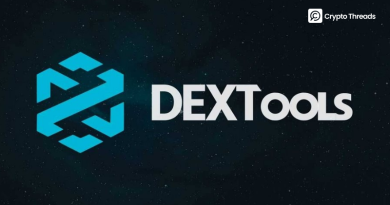What Are Cryptocurrency Venture Capital Funds And Their Role In The Web3 Ecosystem?
Venture capital funding surging in crypto Source: The New York Times
In the rapidly evolving world of blockchain technology, cryptocurrency venture capital funds are playing a pivotal role in driving the development of promising web3 projects. To truly understand this type of investment, let’s explore each aspect in detail, helping you grasp the modern trends in decentralized finance through a comprehensive educational journey.
Understanding The Nature Of Cryptocurrency Venture Capital Funds
Think of cryptocurrency venture capital funds as specialized financial organizations that focus entirely on investing in high-potential web3 companies. The key to understanding their importance lies in recognizing how they differ from traditional investment funds. While traditional venture capital might spread investments across diverse industries like real estate, manufacturing, or services, crypto venture funds concentrate exclusively on the web3 space.
Comprehensive web3 ecosystem structure visualization Source: SoluLab
Their investment scope encompasses cryptocurrency and blockchain technology development, decentralized finance commonly known as DeFi, non-fungible tokens referred to as NFTs, and other related technologies within this ecosystem. The primary objective these funds pursue is the ability to identify high-potential projects from their earliest stages, then provide them with necessary financial resources, valuable strategic guidance, and important industry connections to help these projects achieve success.
This focused approach allows these funds to develop deep expertise in blockchain technology, enabling them to better evaluate projects and provide more meaningful support than generalist investors who may lack the technical knowledge to properly assess crypto innovations.
Exploring The Diversity Of Investment Methods
When we discuss investment methods, it’s essential to understand that these funds are not limited to a single approach. Investment transactions can occur through various sophisticated and complex forms that have evolved specifically for the crypto ecosystem.
One of the most prevalent methods is SAFT (Simple Agreement for Future Tokens), which represents an investment contract allowing funds to purchase tokens at preferential prices before they are publicly released. For instance, a fund might invest two million dollars in a DeFi project through SAFT to receive tokens at a forty percent discount compared to the later public sale price. This mechanism provides early supporters with significant upside potential while giving projects the capital they need during crucial development phases.
Traditional funding rounds such as pre-seed, seed, and Series A remain highly important in this space. Binance Labs, for example, frequently participates in seed rounds with investments ranging from one hundred thousand to three million dollars, typically acquiring five to fifteen percent equity stakes in blockchain startups. These traditional structures provide familiar frameworks for both entrepreneurs and investors while adapting to the unique needs of crypto projects.
Private sales and IDOs (Initial DEX Offerings) represent another favored approach among institutional investors. During private sales, major funds like a16z crypto might invest ten to fifty million dollars in a project with token prices sixty to eighty percent lower than public listing prices. This substantial discount compensates for the higher risk and longer lock-up periods typically associated with early-stage investments.
Beyond these established methods, modern approaches have emerged including revenue sharing agreements, liquidity mining programs, and governance token distribution. Consider how a fund might receive two percent of total protocol revenue over five years instead of holding traditional equity stakes. This model aligns investor interests directly with project success while providing ongoing cash flows rather than requiring eventual exit events.
The particularly fascinating aspect here is that investment value growth potential can be tremendously significant when projects demonstrate their success. A one million dollar investment in Ethereum during 2014 could be worth hundreds of millions of dollars today, illustrating the extraordinary returns possible in this emerging asset class.
Essential Role Within The Web3 Ecosystem
Early stage investment decision framework Source: Chainlink Blog
To truly appreciate the importance of cryptocurrency venture capital funds, we need to examine their role within the broader web3 financial ecosystem picture. Their impact extends far beyond simple capital provision, creating network effects that benefit the entire industry.
From a financial and strategic support perspective, these funds serve as crucial capital providers for early-stage projects. They don’t merely provide money but actively help startups develop their products sustainably, scale operations effectively, and bring new technologies to market efficiently. This comprehensive support often includes technical advisory, business development guidance, and operational expertise that cash alone cannot provide.
Another equally important aspect involves building market confidence through their investment decisions. When a project receives funding from reputable industry funds, this acts as a “stamp of approval” for the technology or field that project operates within. This endorsement effect attracts attention and investment from other investors as well as stakeholders throughout the ecosystem, creating momentum that individual projects would struggle to generate independently.
Regarding technological innovation promotion, although funds may sometimes tend to prioritize short-term profits over long-term project vision, they generally contribute positively to advancing technological progress and broader blockchain technology adoption in society. Their involvement often accelerates development timelines and helps projects reach critical mass more quickly than would otherwise be possible.
Developing Deeper Understanding Of The Investment Process
To gain a more comprehensive view of how these funds operate, we can envision them as professional gardeners within the digital finance ecosystem. Just as careful gardeners deliberately select which seeds to plant and nurture, crypto venture funds identify promising blockchain projects and provide necessary resources for their growth.
This process includes thorough due diligence, where fund managers evaluate technology, teams, market potential, and business models of each project. The evaluation process has become increasingly sophisticated, often involving technical audits, tokenomics analysis, competitive landscape assessment, and regulatory compliance review. Investment timelines typically extend across multiple years, during which funds provide not only capital but also serve as advisors, offer strategic counsel, and facilitate access to industry network connections.
This comprehensive support system significantly increases project success probability compared to projects relying solely on individual investors or crowdfunding approaches. The mentorship aspect often proves as valuable as the financial investment, particularly for first-time crypto entrepreneurs who may lack experience navigating the unique challenges of building decentralized protocols.
Future Trends And Market Outlook
Navigating future digital finance trends Source: Unblogdedanza
The cryptocurrency venture capital landscape is experiencing fascinating transformations that will reshape how we think about digital finance investment. To understand where this industry is heading, consider how traditional venture capital evolved over decades from small, relationship-based investments to today’s sophisticated, data-driven approaches.
Currently, we are witnessing several noteworthy trends that deserve your attention. Institutional investors, including pension funds and university endowments, are increasingly allocating portions of their investment portfolios to cryptocurrency venture funds. This shift represents a fundamental change in how traditional finance views blockchain technology, moving from skeptical attitudes toward strategic embrace.
The geographic distribution of cryptocurrency venture capital is also expanding beyond Silicon Valley and major financial centers. Countries like Singapore, Switzerland, and the United Arab Emirates are establishing themselves as important hubs for blockchain innovation, often supported by regulatory frameworks that encourage experimentation while maintaining investor protection. This geographic diversification brings different perspectives and expertise to the global crypto ecosystem.
Perhaps most intriguingly, the investment thesis itself is evolving significantly. Early-period cryptocurrency venture funds primarily focused on token price appreciation and quick returns. Today, more mature funds are developing deeper expertise in specific sectors such as decentralized autonomous organizations, cross-chain interoperability, and real-world asset tokenization. This specialization allows them to provide more meaningful guidance to portfolio companies while better managing risk through focused expertise.
Looking ahead, artificial intelligence integration with blockchain technology presents both opportunities and challenges for venture funds. Those that can successfully identify projects combining AI and blockchain may find themselves at the forefront of the next major technological revolution. However, this requires fund managers to develop expertise across multiple complex domains, demanding continuous learning and adaptation in an ever-evolving technological landscape.



